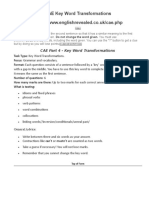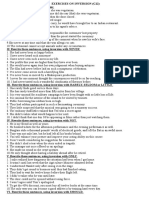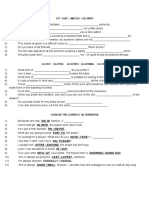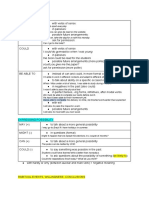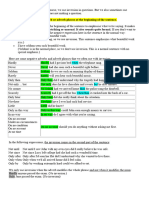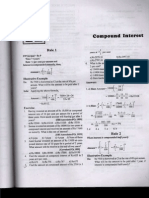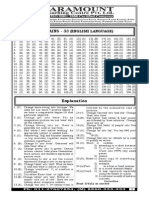Inversion Explanation Adverbs
Inversion Explanation Adverbs
Uploaded by
NitinGuptaCopyright:
Available Formats
Inversion Explanation Adverbs
Inversion Explanation Adverbs
Uploaded by
NitinGuptaOriginal Description:
Original Title
Copyright
Available Formats
Share this document
Did you find this document useful?
Is this content inappropriate?
Copyright:
Available Formats
Inversion Explanation Adverbs
Inversion Explanation Adverbs
Uploaded by
NitinGuptaCopyright:
Available Formats
INVERSION CONCEPTS
Inversion happens when we reverse (invert) the normal word order of a structure, most commonly
the subject-verb word order. .
In case of inversion we invert the subject and auxiliary verb or main verb in the sentence to give
emphasis. This happens:
After certain expressions when they are at the beginning of a sentence.
Seldom In / Under no circumstances
Not Until Never/Rarely/Little
Scarcely/Hardly/Barely Nowhere
Hardly (ever)... when Never before
No sooner... than Not only... but also
On no occasion In no way / On no condition
Nor / Neither Not even once/Not for a moment
On no account Only in this way/Onlyafter/Only if
So +Adverb/adjective Such+Adverb/Adjective
After negative adverbs:-
Rarely do we see him these days.
No sooner had we got into the house than he phoned us.
Hardly had I arrived home when my phone rang. (I had hardly arrived home when my phone
rang.)
Scarcely had she finished reading when she fell asleep. (She had scarcely finished reading
when she fell asleep.)
Barely had they won the match when the coach had a heart attack. (They had barely won
the match when the coach had a heart attack.)
No sooner had the company launched its new product than it went bankrupt. (The company
had no sooner launched its new product than it went bankrupt.
Never (before) have we faced such a challenge! (We have never faced such a challenge!)
Little did she understand what the conversation was about. (She didn't really understand
what the conversation was about.)
Under no circumstances are you allowed to disturb the pilots. (You are not allowed to
disturb the pilots under any circumstances.).
On no condition will the company bear responsibility for lost property. (The company will
not bear responsibility for lost property on any condition.)
In no way am I related to the suspect. (I am in no way related to the suspect. )
Not only did he exceed the speed limit, but he had also consumed alcohol. (He not only
exceeded the speed limit, but he had also consumed alcohol.)
Not only were you late, but you didn't even have a good excuse. (You were not only late, but
you didn't have a good excuse either.)
Not till I got home did I realise my wallet was missing.
Not for a moment did I think I would be offered the job, so I was amazed when I got it.
NOTE:-We use inversion when the adverb modifies the verb, and not when it modifies the
noun:
Rarely seen during the day, the badger is a famously shy animal. (= inversion)
Hardly anyone knows about it. (= no inversion)
When the following expressions begin a sentence, we use inversion in the main
clause. Only after, only by, only if, only when, not till / until, not since.
Only after he had graduated, did he start looking for a job.
Only if you invite her, will she come to your party.
Not until all tests had been completed, were we told the results.
Only after lunch can you play. (You can only play after lunch.)
Only after finishing your homework can you play. (You can only play after you finish your
homework.)
Only after you have finished your homework can you play. (You can only play after you have
finished your homework.)
Only by guessing can you solve this puzzle. (You can only solve this puzzle by guessing.)
Only if everybody agreed would I accept this position. (I would only accept this position if
everybody agreed.)
Only in this way does this machine work. (This machine only works in this way.)
Only then did they discover his secret. (They only discovered his secret then.)
Only when he needed some help did he call me. (He only called me when he needed some
help.)
Only when I filled my glass did I notice that it was broken. (I only noticed that my glass
was broken when I filled it.)
The last sentence can be rephrased as:
Not until I filled my glass did I notice that it was broken. (I didn't notice that my glass
was broken until I filled it.)
NOTE :- If only is followed by the subject at the beginning of the sentence, there is no
inversion:
Only you can understand. (No one else can understand.)
Only Fiona knew the answer to the question.
After so, such, to such a degree (in result clauses) when they are at the beginning of a
sentence.
So careful is he that he never makes any mistakes.
Such a brilliant student was he that he was offered a scholarship.
So excited were they that they couldn't sit still.
Such was their excitement that they began to jump up and down.
To such a degree has Frank analysed the system that no problem is left.
Note that "So" is followed by an adjective and "Such" can be replaced by "So great" (So great was
their excitement that...)
With should, were, had in conditionals at the beginning of the sentence when if is omitted.
Type 1: Should you see him, tell him to call me. (= If you should see him...)
Type 2: Were I you, I would cancel my trip. (= If I were you...)
Type 3: Had he known, he would have made arrangements. (= If he had known...)
Note :- "should", "were" and "had" are the only verbs that can be inverted in this way.
After so, neither / nor, as when expressing agreement.
I hate horror films. So do I. (So is used to agree with an affirmative statement.)
Jane hasnt returned our calls. Neither / Nor has her husband. (Neither / Nor are
used to agree with a negative statement,though use Nor in formal English).
His colleagues respected him as did his boss.
The subject and the main verb are also usually inverted in the following structures:
Down the hill rolled the children.
Round the corner was a nice caf.
Here comes the bride!
Away ran the thief!
There goes Tom!
but: There he goes!
Ive just finished,said Tom.
but: Ive just finished,he said.
This is a rhetorical device used mainly in formal and literary styles; however, it may also occur in
everyday conversation:
Here comes the bus.
There goes Sally.
Here's my number.
But if the subject is a personal pronoun, there is no inversion:
Here it comes.
There she goes.
Here it is.
Compiled by:Nitin Gupta
CHEERS !!
Neither I nor my friend lives here.(wrong)
Neither do I nor does my fiend live here.(correct)
Neithr he smokes nor he drinks(wrong)
Neither does he smoke nor does he drink.(right)
You might also like
- Power Words: Words That Will Win Your Ex BackDocument20 pagesPower Words: Words That Will Win Your Ex Backderek652853% (15)
- C1 Advanced Use of English Part 4 Key Word TransformationsDocument8 pagesC1 Advanced Use of English Part 4 Key Word TransformationsPatrick KellyNo ratings yet
- CAE Key Word TransformationsDocument7 pagesCAE Key Word TransformationsAnonymous m3yrUP100% (1)
- Use of English For FceDocument9 pagesUse of English For FcePhúc Bảo Ngọc nguyễnNo ratings yet
- Upstream CAE Test 4Document3 pagesUpstream CAE Test 4adevoicuNo ratings yet
- Cleft and Pseudo-Cleft Sentences PDFDocument2 pagesCleft and Pseudo-Cleft Sentences PDFAnaBueno_LearnEnglishNo ratings yet
- Star Wars Living Force - Among The Stars - LFA206 - Almas Sweet Almas 1 - The Kaluthin Are Always Greener PDFDocument21 pagesStar Wars Living Force - Among The Stars - LFA206 - Almas Sweet Almas 1 - The Kaluthin Are Always Greener PDFtwhNo ratings yet
- Descriptive Review SampleDocument5 pagesDescriptive Review SampleKaustubh JoshiNo ratings yet
- Flyers Reading and Writing Test 4 PDFDocument12 pagesFlyers Reading and Writing Test 4 PDFSorin Sotoc100% (1)
- Inversions B2 Extra PracticeDocument2 pagesInversions B2 Extra PracticeKharina Montero100% (1)
- Words With Negative Prefixes For CAEDocument2 pagesWords With Negative Prefixes For CAETatiana MitrokhinaNo ratings yet
- CAE Use of English Part 4Document1 pageCAE Use of English Part 4RaquelcampinoyaitanaNo ratings yet
- C1 - Advanced-Cae-Speaking-PhrasesDocument1 pageC1 - Advanced-Cae-Speaking-PhrasesdanielNo ratings yet
- C1 - ReviewDocument8 pagesC1 - ReviewSofia Rodriguez BallesterosNo ratings yet
- C1 Key Word Transformation Exercises (Phrasal Verbs and Fixed Expressions)Document3 pagesC1 Key Word Transformation Exercises (Phrasal Verbs and Fixed Expressions)Earl Oliver IberoNo ratings yet
- CAE Key Word Transformations 1Document4 pagesCAE Key Word Transformations 1Cristina CBNo ratings yet
- Word Formation 1 C1Document1 pageWord Formation 1 C1Consuelo Pinilla Peñarrubia100% (1)
- ConditionalsDocument4 pagesConditionalsralucaNo ratings yet
- UNREAL TENSES (Wish, If Only, Hope, Suppose, Imagine)Document2 pagesUNREAL TENSES (Wish, If Only, Hope, Suppose, Imagine)Mariana Gisele Tison100% (3)
- Fce Speaking PhrasesDocument1 pageFce Speaking PhrasesRodica Ioana Bândilă100% (1)
- Word Formation CAEDocument2 pagesWord Formation CAEAnna Paula MatosNo ratings yet
- How To Write A Report c1 Advanced CaeDocument6 pagesHow To Write A Report c1 Advanced CaeAlina MihaiNo ratings yet
- Inversion of Order & EmphasisDocument19 pagesInversion of Order & EmphasisLucia Falco33% (3)
- Word Formation c1Document8 pagesWord Formation c1Bi Max100% (1)
- CAE Speaking Part 2, Set 12Document2 pagesCAE Speaking Part 2, Set 12sonsoles Mollinedo100% (1)
- InversionDocument2 pagesInversioncuen32100% (1)
- Try Something Like This: Answer The Question. PLAN Your Essay. REVISE Your Essay To Correct MistakesDocument4 pagesTry Something Like This: Answer The Question. PLAN Your Essay. REVISE Your Essay To Correct MistakesRobert Alex100% (1)
- Fit Match Goes With KeyDocument2 pagesFit Match Goes With KeyZsuzsa SzékelyNo ratings yet
- 20 Advanced Practice Tests With KeyDocument187 pages20 Advanced Practice Tests With KeyAnh ThưNo ratings yet
- ENGL 305 (Unit 1 Grammar) Negative Inversion - Practice ExercisesDocument2 pagesENGL 305 (Unit 1 Grammar) Negative Inversion - Practice Exercisesaurora228No ratings yet
- Fce Vocabulary Writing ReviewsDocument7 pagesFce Vocabulary Writing ReviewsCarlosNo ratings yet
- Prepositions Key Word Transformations B2Document1 pagePrepositions Key Word Transformations B2LeighNo ratings yet
- Cae Use of English Part 3Document6 pagesCae Use of English Part 3papalazaru100% (1)
- Multiple Choice Cloze 1 CAEDocument3 pagesMultiple Choice Cloze 1 CAEAnna Paula MatosNo ratings yet
- FCE Word Formation - ExercisesDocument21 pagesFCE Word Formation - ExercisesEl ÚlTimo PriMate100% (2)
- Proficiency - InversionDocument36 pagesProficiency - InversionLindsey Cottle100% (2)
- Destination B1 Phrasal VerbsDocument7 pagesDestination B1 Phrasal VerbsSattela BartinamNo ratings yet
- Transformations - CPE Use of English - Units 1-5Document30 pagesTransformations - CPE Use of English - Units 1-5oskarrrr2005No ratings yet
- Word Formation 2015 Fce CaeDocument5 pagesWord Formation 2015 Fce CaeMaría Daniela BroccardoNo ratings yet
- CAE Use of EnglishDocument12 pagesCAE Use of EnglishLeezukaNo ratings yet
- Cae Keyword Transformations Verb PhrasesDocument11 pagesCae Keyword Transformations Verb PhrasesXantal GarciaNo ratings yet
- Fce (B2)Document14 pagesFce (B2)Elisabet Muñoz Marín100% (1)
- Modals - CaeDocument4 pagesModals - CaeGemma HSNo ratings yet
- 1: Put The Verb Into The Correct Form, Present Continuous or Present SimpleDocument7 pages1: Put The Verb Into The Correct Form, Present Continuous or Present SimpleVictoria KozlovaNo ratings yet
- C1 Advanced Speaking Worksheet 1Document6 pagesC1 Advanced Speaking Worksheet 1Miranda WilkinsonNo ratings yet
- Word FormationDocument9 pagesWord FormationrgsastreNo ratings yet
- Cae Speaking PhrasesDocument2 pagesCae Speaking PhrasesJeremy BentleyNo ratings yet
- Reported Speech 2018 AdvancedDocument6 pagesReported Speech 2018 AdvancedDazoluchi07No ratings yet
- Key CAE Sentence TransformationDocument10 pagesKey CAE Sentence TransformationTrang LuongNo ratings yet
- Cae Writing Part 2 PackDocument7 pagesCae Writing Part 2 Packstigar58No ratings yet
- First Certificate Speaking QuestionsDocument6 pagesFirst Certificate Speaking QuestionsAnca Diana PaleuNo ratings yet
- Use of English Sample CAEDocument20 pagesUse of English Sample CAEDarkMocha100% (1)
- Speaking Cae Part 3Document4 pagesSpeaking Cae Part 3lorena_berlanasNo ratings yet
- Cae Writing c1 Planning PDFDocument6 pagesCae Writing c1 Planning PDFanamelgarNo ratings yet
- Writing Tips For FCEDocument7 pagesWriting Tips For FCEthrylla100% (1)
- CAE Speaking - Useful LanguageDocument3 pagesCAE Speaking - Useful Languageale100% (1)
- FCE WritingsDocument20 pagesFCE WritingsaisthesicNo ratings yet
- Cae Speaking PhrasesDocument1 pageCae Speaking PhrasesJayne WojtasikNo ratings yet
- Speaking Parts 3 & 4 GlobalDocument11 pagesSpeaking Parts 3 & 4 GlobalMarta67% (3)
- FCE Speaking Part 3Document1 pageFCE Speaking Part 3lets goNo ratings yet
- INVERSION ExplainedDocument77 pagesINVERSION Explainedmichele100% (1)
- Inversion + Advanced Structures in WritingDocument5 pagesInversion + Advanced Structures in Writingj.jagielaNo ratings yet
- Inversion AdverbsDocument13 pagesInversion AdverbsZahariuc AndreeaNo ratings yet
- Aftab Alam Vinit Agarwal Yash Gupta JaydeepDocument11 pagesAftab Alam Vinit Agarwal Yash Gupta JaydeepNitinGuptaNo ratings yet
- English Keys Cgl15Document2 pagesEnglish Keys Cgl15NitinGuptaNo ratings yet
- Conjunctions Chapter 10Document2 pagesConjunctions Chapter 10NitinGupta100% (1)
- 8 Weeks Cooks TrainingDocument4 pages8 Weeks Cooks TrainingNitinGuptaNo ratings yet
- Inter Zonal Transfer Policy in FciDocument1 pageInter Zonal Transfer Policy in FciNitinGuptaNo ratings yet
- CGL 13 Cut Offs VacanciesDocument4 pagesCGL 13 Cut Offs VacanciesNitinGuptaNo ratings yet
- Error SpotingDocument58 pagesError SpotingindrajitmetyaNo ratings yet
- 8 ErrorsDocument5 pages8 ErrorsNitinGuptaNo ratings yet
- English Spotting ErrorsDocument14 pagesEnglish Spotting ErrorsIndrani DasNo ratings yet
- Chapter 12Document16 pagesChapter 12NitinGupta100% (1)
- SSC Mains - 33: (English Language)Document3 pagesSSC Mains - 33: (English Language)NitinGuptaNo ratings yet
- Focus t25 Nitin ScheduleDocument2 pagesFocus t25 Nitin ScheduleNitinGuptaNo ratings yet
- Acology - Study of Medical RemediesDocument2 pagesAcology - Study of Medical RemediesNitinGuptaNo ratings yet
- SSC 69Document10 pagesSSC 69NitinGupta100% (2)
- Average Short Cut Tricks For Banking & SSC Exams by Das SirDocument5 pagesAverage Short Cut Tricks For Banking & SSC Exams by Das SirNitinGuptaNo ratings yet
- Introduction To Domestic TourismDocument52 pagesIntroduction To Domestic TourismCusap RegineNo ratings yet
- Magnesium Sulfate HeptahydrateDocument7 pagesMagnesium Sulfate HeptahydrateLord Lee CablingNo ratings yet
- ENGLISH LANGUAGE TEST (MESSAGES1-third Trimester Test) B Student's Full Name - ClassDocument3 pagesENGLISH LANGUAGE TEST (MESSAGES1-third Trimester Test) B Student's Full Name - ClassBiljana PetrovskaNo ratings yet
- Testing Interview QuestionsDocument87 pagesTesting Interview QuestionsNimisha8730No ratings yet
- De Guzman Et. AlDocument58 pagesDe Guzman Et. AlJen DulayNo ratings yet
- TNV 766 PDFDocument280 pagesTNV 766 PDFSatyabrat DuttaNo ratings yet
- DCC3113 - Chapter 5 PDFDocument24 pagesDCC3113 - Chapter 5 PDFXkarr Rasta100% (1)
- 05 Lwali LukuluDocument1 page05 Lwali LukuluNatasha Wyne100% (1)
- How To Find Your Life Purpose Personal Excellence EbookDocument69 pagesHow To Find Your Life Purpose Personal Excellence EbookAnkit AgrawalNo ratings yet
- William James' Four Characteristics of Mystical Experience: IneffableDocument11 pagesWilliam James' Four Characteristics of Mystical Experience: IneffableRuel ArancesNo ratings yet
- The Lowdown On Number Talks-4Document4 pagesThe Lowdown On Number Talks-4api-535847665100% (1)
- Ed 200 Midterm ExamDocument6 pagesEd 200 Midterm ExamJheann EstopaNo ratings yet
- 02769K HT F450BK Eng - Mic 0218 PDFDocument30 pages02769K HT F450BK Eng - Mic 0218 PDFbintangaditya19No ratings yet
- The Dark Side of Digital HumanitiesDocument14 pagesThe Dark Side of Digital Humanitiessongaeyun0120No ratings yet
- University of Northern Philippines: IndividualDocument7 pagesUniversity of Northern Philippines: IndividualRoselyn Lazaro TamayoNo ratings yet
- Jaime Escalante How To Teach Math 071609Document17 pagesJaime Escalante How To Teach Math 071609whvn_havenNo ratings yet
- 6th STD Social Science Indus CivilisationDocument3 pages6th STD Social Science Indus CivilisationS.P. SIVAKAMALINo ratings yet
- ISOM2700 Practice Set4 UpdatedDocument8 pagesISOM2700 Practice Set4 UpdatedgNo ratings yet
- Official Membership FormDocument2 pagesOfficial Membership FormjilbayambangNo ratings yet
- Language Culture and ThoughtDocument24 pagesLanguage Culture and ThoughtLý Hiển NhiênNo ratings yet
- Alpha Charger c25Document24 pagesAlpha Charger c25Muhammad SyukurNo ratings yet
- 6.Dr. Neeraj GohilDocument8 pages6.Dr. Neeraj Gohilkeerthi kumariNo ratings yet
- Which of The Following Can Be Said About The KingDocument34 pagesWhich of The Following Can Be Said About The Kingprasathkrp100% (2)
- CommunityStandard WELLDocument148 pagesCommunityStandard WELLIoana ChinanNo ratings yet
- Benchmarking of Oneplus-76Document11 pagesBenchmarking of Oneplus-76Hemasri ChinnuNo ratings yet
- Institute of Business Administration, Karachi: Step-By-Step Assignment InstructionsDocument4 pagesInstitute of Business Administration, Karachi: Step-By-Step Assignment InstructionsMaha Siddiqui100% (2)


